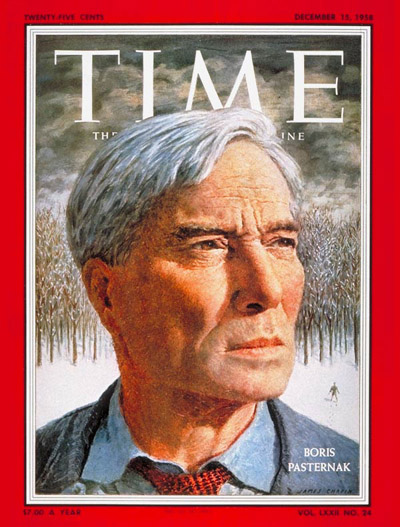The following review by Frye, overlooked for the Collected Works, appeared under the “Turning New Leaves” column of the Canadian Forum 38 (December 1958): 206–7. Frye reviews Boris Pasternak’s Doctor Zhivago, trans. Max Hayward and Mania Harari (London: Collins and Harvill Press).
Reading this book is quite an experience; reviewing it, for one who knows no Russian, is an exercise in frustration. It is abundantly clear that it is more of an epic poem than a novel. The two main attributes of the conventional novel, vitality of character drawing and logicality of plot, are hardly present at all. The story is a series of detached episodes connected by the most preposterous coincidences. Characters wander in and out, or die and come back to life under other names. Only the incidental characters are described with much vividness, while the main figures loom up as cloudily as the heroes of Ossian. But all the time we are aware that some different principle of unity is holding the book together, a principle based, as in most poetry, on the imagery, and on the symbolic values attached to that imagery. It is not the picture of the revolution and civil war that organizes the narrative; it is the meaning that the author gives to such figures as the caryatids on a building, to iced rowanberries and lilacs, to the weeping face of the heroine Lara, to a waterfall that is associated with the dragon of a knight-errant romance, to the Siberian forest and its wolves, to the incessant references to the festivals of the Church, especially Christmas and Easter. The author himself says that his hero was a poet interested in the techniques of symbolisme, because it is based on the principle “that communion between mortals is immortal, and that the whole of life is symbolic because the whole of it has meaning.” A series of poems at the end, supposedly by Zhivago, provide the symbolic keys to the story. But nobody can unravel this kind of writing except in the original language. The translators do their best, but candidly admit that their translation has been done in a hurry and that it makes no attempt to give much more than the general sense. What follows is consequently very tentative, and is designed only to encourage others to read the book for themselves.
The story itself is simple enough. Yury Zhivago, whose father’s suicide starts the book off, is brought up in Czarist Russia and studies medicine. He is also a poet, but does not regard poetry as a profession. Drafted as a medical officer in the First World War, he sees the revolution bring unparalleled social chaos to Moscow, where he lives, and sets out with his wife and family to a village in the Urals. There he manages, through the charity of an old friend, to live on the land for a while, though his emotional life is complicated by the reappearance of a girl he had known from childhood, Lara, now married to a non-party revolutionary whose new name is Strelnikov. In the civil war Zhivago is kidnapped by the Reds because of his medical knowledge, and spends some years with the partisans in incredible hardship and misery, while his family make their way back to Moscow, whence they are exiled from the country. Released at last, Zhivago goes back to the Ural village and has a brief and beleaguered affair with Lara, until it becomes obvious that Lara and her husband are next on the shooting list. A middle-age roué named Komarovsky, who had debauched Lara in her youth and who is one of those greased eels that can wriggle through any society, communist or bourgeois, takes Lara off to the “Far Eastern Republic” in East Siberia, while Strelnikov shoots himself and Zhivago goes back to Moscow, a broken man. Zhivago dies of a heart attack in a Moscow street car, and Lara, back from the Far East, disappears into “one of the innumerable mixed or women’s concentration camps in the north.” An epilogue, dated during the Second World War, says that “a presage of freedom was in the air throughout these post-war years, and it was their only historical meaning.” Thus the book ends in a mood of serenity and hope. We, of course, know that it has a second epilogue.
Doctor Zhivago is not by any means an anti-Red polemic, and it is only the terrified Soviet bureaucrats who have made it one. In this country, where it is assumed that it is part of the job of a serious novelist to make serious criticisms of his society; it would hardly have raised a ripple or real controversy. Zhivago was, like Pasternak himself, a grown man when the revolution began, and hence feels detached from the struggle to the extent of not accepting the official version of it as a crude melodrama of heroes and villains. “It’s only in bad novels,” the author remarks, “that people are divided into two camps and have nothing to do with each other. In real life everything gets mixed up.” But he makes it clear that however brutal and savage the Reds were, the Whites were far worse, as, like all Fascists, they added sexual sadism to ordinary brutality. Pasternak merely says what the communists themselves would say, in other and more carefully controlled contexts, that the real revolution, the bringing of freedom and equality to man, has not yet begun. Also, like Tolstoy and Dostoevsky before him, though in a way quite different from either, he is comparing the Russian society of his time with the vision of life set out in the Christian Gospel.
